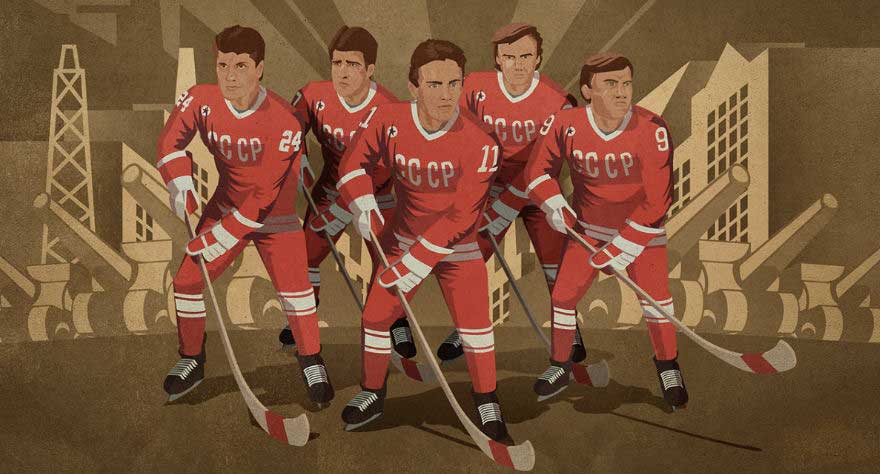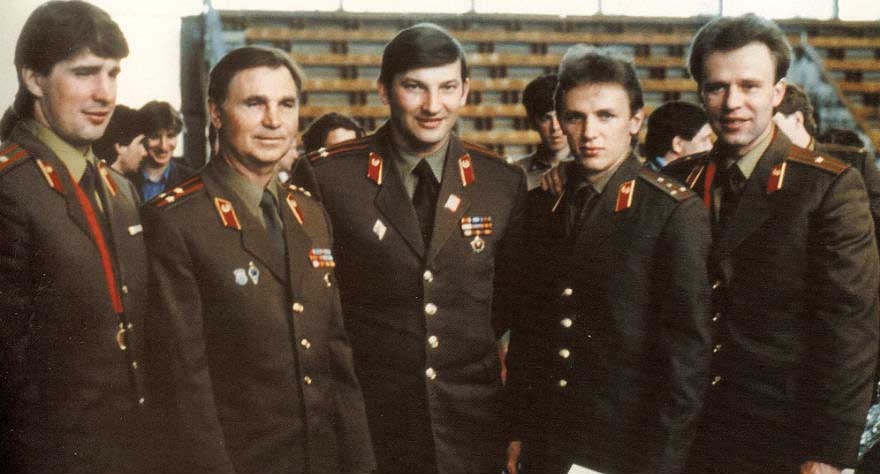
A psychology-driven sports doc that illuminates why Russia's hockey team was so good for so long.

A psychology-driven sports doc that illuminates why Russia's hockey team was so good for so long.
Today, in this country, massive sporting events like the Super Bowl and the World Series are charged with fevered passion and hometown pride (and cute party platters arranged to look like footballs). But decades ago, at the 1980 Olympics, when an under-powered crew of amateur college hockey players defeated the seemingly bulletproof Soviet squad in what would be remembered as the “Miracle on Ice”, the game surged with a different kind of energy, stemming from the stormy political climate of the Cold War. At the time, Russia used their dominant ice hockey team (they flattened virtually all challengers from 1954-91) as a bullhorn to herald the preeminence of communism to the world. Tensions were so high between the US and Russia that Ronald Reagan made a speech underlining the political implications of the game, saying it would be “sheer folly for us to not make every conceivable preparation to win.”
It was a high-stakes playing field, and with his sharply composed sports documentary Red Army, filmmaker Gabe Polsky (The Motel Life) explores just how shockingly high the stakes really were for the five key Russian players (famously known as the “Russian Five”) who succeeded the felled Soviet team and struggled with a shaken sense of national identity when the crushing demands of their superiors (including the high-ranking government officials) eventually drove them to defect to the US to play for the NHL. The film is about as riveting as sports docs get, peeling back the layers of men who many viewed simply as enigmatic sports prodigies, but had in reality endured enough physical and psychological abuse to fill up two films. But Polsky keeps the story taut, using expert testimonials, archival footage, and incisive interviews with the players themselves to form a brisk, 85-minute powerhouse of a movie.
Our guide through the history of the team and the infamously harsh (and successful) Russian hockey program is Viacheslav “Slava” Fetisov, the extensively decorated team captain who led his squad to a slew of victories over the course of several years. We’re introduced to him in an unexpected moment of frustration: in the middle of a sit-down interview, Slava holds up his hand to halt the questions of an off-camera Polsky’s while he pokes around on his phone and takes a call, handling business matters, we assume. The director waits for a moment, but then ignores the request for a break and proceeds to ask a hilariously protracted question, goading the testy Slava to throw up a big fat middle finger in an act of annoyed defiance. He’s rude, yes, but there’s something magnetic about the way he carries himself, always moving and speaking with purpose and without compromise. Even at 56 he’s an alpha male through and through, and he’s clearly endured a lot in his lifetime.
Before Slava was named the youngest Russian team captain in history, he grew up in a tiny Moscow apartment with no running water shared between three families. It was a tough upbringing, but despite his parents’ dire financial situation, they bought the young Slava some hockey gear and sparked what would become one of the greatest careers in the history of the game. He eventually joined the hockey club, whose advertisements were militaristic in tone because, well, the club was run by the Russian army. “Real men play hockey! Cowards don’t play hockey!”

Slava’s first coach, Anatoly Tarasov, was his Obi-Wan Kenobi, instilling in he and his team the value of passing and finesse. Unlike the American teams, who used brute force and bulldozing aggression on the ice, the Russians moved like chess pieces, gliding the puck between each other with such control and strategic positioning that no team could crack their code, making them somewhat unbeatable. Slava’s teammates were Alexei Kasatonov (his best friend), “The Professor” Igor Larionov, “The Tank” Vladimir Krutov, and Sergei Makarov. The five were like brothers, spending every waking hour with one another and forging an unbreakable bond. “We were the same,” Slava says with a grin.
Despite national acclaim, the pressures of playing for the Red Army began to eat away at the boys, who at the hands of new coach Viktor Tikhonov had been subjected to horrific training conditions. They’d work out with a sustained heart rate of 220 bpm, would regularly train so hard they pissed blood, and lived in barracks with only one month of off-time a year. The team was fed up with the way they were being treated, and by the time Slava was offered a spot on the New Jersey Devils, he was practically itching to leave.
It wasn’t as easy as packing up and shipping off, however, as members of the Russian government were furious at Slava’s intention to defect. Officials did everything they could to keep him on Russian soil, to the point where the glorious team captain was brutally beaten in private and ostracized by his family and friends. “You want to play for our enemies? I’ll send you to Siberia. You’ll never get out,” an authority told Slava. It’s only natural to empathize with his position, especially in today’s climate in which Russia has reassumed its antagonistic perception in recent years. The lengths to which the government went to to keep their star players from leaving is as astounding as it is alarming. Slava did eventually manage to make his way to the states (he keeps the details of his escape from Russia suspiciously hazy, which Polsky cleverly highlights), as did his teammates, but it wasn’t all roses and fanfare upon their arrival. The Americans had no appreciation for the Russians’ balletic style of hockey, leaving them stranded on teams that couldn’t sniff the greatness of the “Russian Five” heyday.
Red Army is most stirring when it examines the painful inner-struggle of these men who left behind a country and government that took a heavy toll on their lives, but who could also never abandon their innate sense of nationalistic pride. While Slava’s time on the team ended badly, he admits in the film that he was very proud to be the captain of his country’s widely beloved hockey team. It’s these complexities that are often glossed over in the Russian team’s depiction in movies like Disney’s Miracle, but Polsky uses these inner conflicts as the driving force behind his Iron Curtain exposé, to great success.